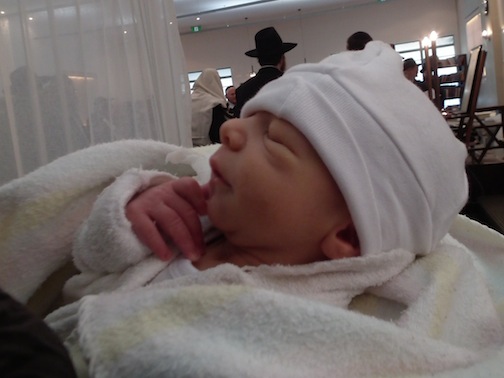Parshas Bamidbar: Redemption of the Firstborn
Last week, thank G-d, I gave birth to a beautiful and healthy son (bli ayin hara). He is our first child and a son and therefore is extra-special. In Judaism, there’s a special mitzvah called a Pidyon HaBen, or the Redemption of the Firstborn, that can only be done under special circumstances. I am thrilled that, please G-d, we will be able to partake of this very rare and special mitzvah in just a few short weeks’ time.
So how fitting and special that it is in this week’s parsha, Bamidbar, that we find this mitzvah. In it, we find G-d saying to us, “Behold! I have taken the Levites from among the Children of Israel, in place of every firstborn, the first issue of every womb among the Children of Israel, and the Levites shall be Mine. For every firstborn is Mine: On the day I struck down every firstborn in the land of Egypt I sanctified every firstborn in Israel for Myself, from man to beast; they shall be Mine – I am Hashem.”
The “first issue of every womb” doesn’t mean literally the first child born to every woman. There are some requirements:
- Must be the first child born.
- Must be male.
- Must be a natural birth. (No cesarean sections.)
- The mother must never have miscarried after the first trimester.
- Must not be a Kohen.
- Must not be a Levite.
The firstborn sons were the ones who were originally designated to perform G-d’s service. Indeed, they were even more special to G-d because He specifically passed them over during the slaying of the Egyptian firstborn. G-d chose to give them life when He was taking life away from others, for they were precious to Him. However, during the sin of the golden calf, the firstborn failed him. Unlike the Levites, who not only did not worship the calf but actively fought against those who were doing so, the firstborn sons were indifferent. They didn’t live up to G-d’s expectations. They disappointed Him.
This explains quite a few of the above requirements. Obviously, this would only apply to the first child born, not any subsequent children. Only male children were killed during the plague of the firstborn in Egypt and only men sinned during the sin of the golden calf (the women actively opposed it), so only male children need apply. And the Kohanim and Levites are already in the service of G-d, so they don’t need to be redeemed.
In fact, the Levites were the original “currency” of redemption. The Levites replaced the firstborn and thereby redeemed them. But G-d knew this was not a permanent solution because He could foresee that future generations of Levites would fall from the lofty spiritual heights of their forefathers. Therefore, He instituted the mitzvah of redemption by payment, partially to remind the Levites of how their spiritual level had decreased over time.
Like many mitzvot we find listed in the Torah, the origin of this mitzvah is not necessarily a pleasant story. Nevertheless, it is a mitzvah and as such, being able to fulfill it is an enormous honor. It is a relatively rare ceremony and so is even more special. It is performed after the child has reached at least 30 days of age. We are looking forward to performing this ceremony for our little boy in just a few weeks’ time. Hopefully you’ll be able to join us!
Shabbat shalom!
Read more on Parshas Bamidbar: Into the Desert of Our Lives






